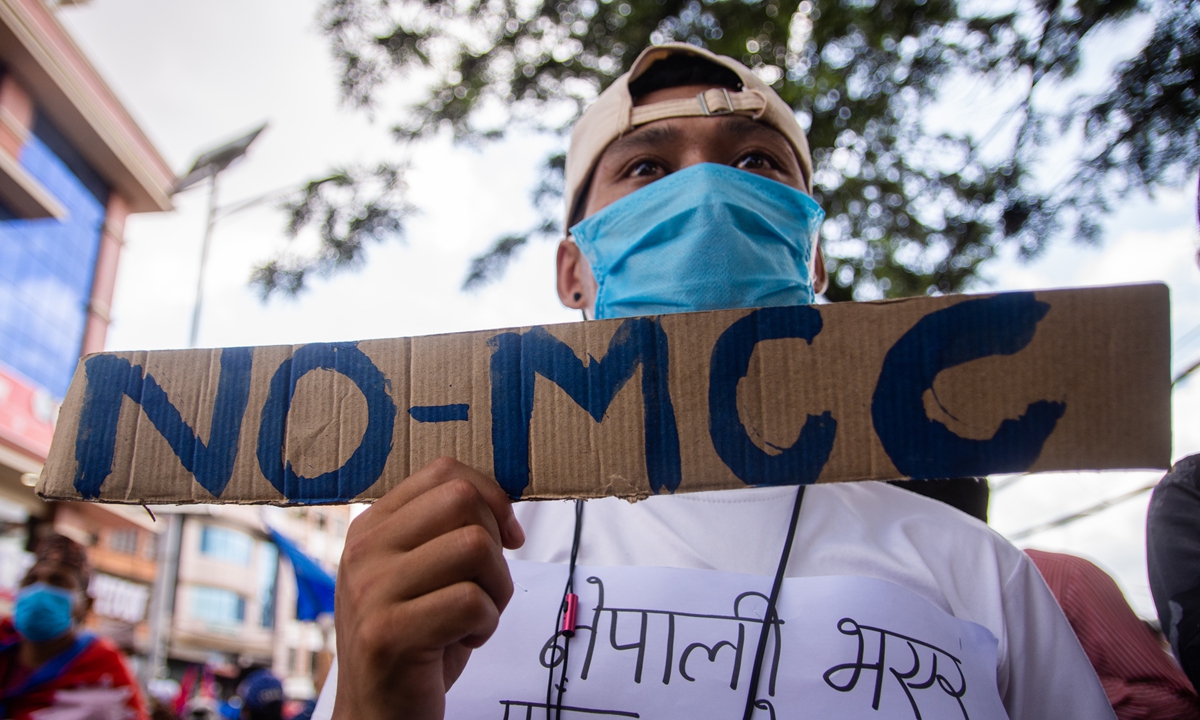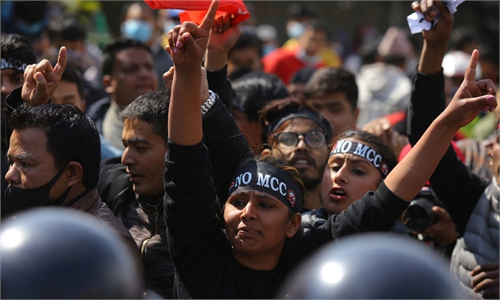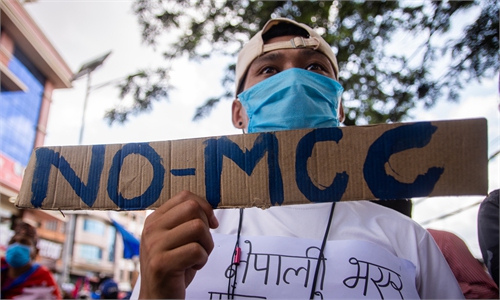MCC pact a Trojan horse disguised by Washington as ‘aid’ to Nepal

A Nepalese youth holds a cardboard sign during a protest against Millennium Challenge Corporation (MCC) programs in Kathmandu, Nepal, on June 27. Photo: AFP
Nepal's parliament on Sunday ratified the Millennium Challenge Corporation (MCC) agreement, an infrastructure aid deal proposed by Washington. While most countries in South Asia remain neutral over the Russia-Ukraine conflicts and urge a peaceful solution, Nepali Prime Minister Sher Bahadur Deuba said on Twitter Wednesday that he discussed with US State Secretary Antony Blinken "our support for Ukraine's sovereignty," suggesting Nepal is in line with the US' rhetoric.
Why has Nepal changed its usual "neutrality"? Is there a connection with the US? Why is the US, along with India, so eager to promote the MCC compact in Nepal?
First of all, this is an important step in Washington's strategic alignment. As the US has made all efforts to promote its Indo-Pacific Strategy, Nepal has undoubtedly become a key pivot in its strategy toward China.
Second, the US seeks to use the MCC to make Nepal an important part of Washington and New Delhi's anti-China coalition.
For a long time, India has seen South Asian countries as nations in its own "backyard," and thus used to block the US' influence in Nepal to a certain extent. But in recent years, New Delhi has clearly shifted its stance on the MCC compact from opposition to "neutrality."
In fact, almost all Indian media remained silent when the US gave Nepal an ultimatum to ratify the MCC pact by February 28. This is obviously related to the US' support of "India's continued rise and regional leadership," which was underlined in the recent report on Washington's Indo-Pacific Strategy.
Moreover, the MCC is a tool to disrupt Nepal's political landscape ahead of this year's elections. Washington has used the agreement as a touchstone to provoke political strife in the country for months. It is likely to support pro-US forces to take power in Nepal by continuing to exploit the MCC as bait.
Also, the US and India are trying to use the pact to resist the China-proposed Belt and Road Initiative (BRI).
Nepal and China signed a memorandum of understanding on bilateral cooperation under the framework of the BRI in 2017. After that, cooperation with China has flourished in Nepal, leading to concerns from the US and India. Since both countries' relationship with Nepal faces problems, turning Katmandu against Beijing has become a consensus that Washington and New Delhi reached.
Nevertheless, if the MCC is implemented in Nepal, it will impact the country's economy, diplomacy, and domestic politics.
Economically, even though the agreement aims to enhance infrastructure, especially in the southern part of the country, it will also increase Katmandu's economic dependence on New Delhi. This runs counter to Nepal's desire for economic autonomy and might incite centrifugal tendencies in the country's southern region.
Diplomatically, Nepal will be forced to change its "equidistance" policy toward China and India. It will have to get itself involved in the US' Indo-Pacific Strategy, and would be used by the US to contain China's development.
In terms of domestic affairs, Katmandu still faces the risk of Washington's intervention in its sovereignty, although the second point of the 12-point interpretative declaration announced on Sunday reads "the Constitution of Nepal… shall prevail over the Compact…"
The promotion of the MCC could also alter the global geostrategic landscape. The US has already shown its tendency to encircle China by drawing in China's neighboring countries.
To be more specific, the tacit approval from India for the US' ambition to expand its power in South Asia will greatly change the geopolitical pattern in the region. India says it has not changed its policy of "non-alignment." However, due to an opportunistic attitude and fears for China's growing power in South Asia, India has chosen to stand by US' side against China under certain conditions.
In addition, after years of posing threats and making promises, Washington has successfully cultivated pro-US forces in Katmandu. A clear shift can be seen in the divergence of the attitude among Nepali politicians and media regarding the MCC deal recently.
With the implementation of the MCC, US military forces might further infiltrate Nepal in line with the compact. This has already been taking place for years in many forms. The US' intention is clear: It aims to obstruct the BRI construction in South Asia, as well as undermine the security and stability of China's southwestern frontier.
The author is a chief expert of the 17ZDA170 project sponsored by the National Social Science Fund of China and carried out by the Institute of South Asian Studies, Sichuan University. opinion@globaltimes.com.cn


